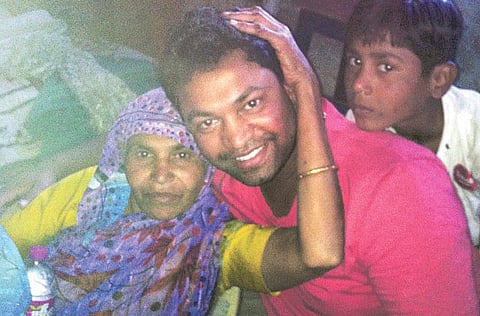Google helps duo unite after 25 years
Indian boy gone missing as a five year old uses internet to track home from Australia

Khandwa: Saroo Brierley pulled up to the train station and stepped out of his car into the chaotic landscape that had haunted his dreams. The swerving bicycles, noisy three-wheelers and vendors’ pushcarts crowding the streets of this Indian town were half a world from where he lived in Australia’s tranquil island state of Tasmania. And yet he knew that once — a lifetime ago — he had called this place home.
It was February 12, 2012, and he hadn’t been here in nearly 25 years, since that nightmarish day when his brother vanished and a train whisked him away from everything he knew. Since then he had ended up an orphan in distant Calcutta, before an Australian couple adopted him and gave him a second chance at family.
It took years of searching the Internet before he finally found his way back to this town. Saroo hadn’t stopped searching for answers. All Saroo had were the vivid memories of his town. His house ... he had recently used Google’s satellite feature to get a bird’s eye view of his Australian house. Would it have similar images of his homeland?
He sat down at a computer and called up a map of India. He randomly zoomed in on a train track and followed it, scrutinizing stations he passed, searching for something familiar. He zeroed in on Calcutta, since that was where he’d ended up, and worked backwards. He narrowed down the search area by multiplying the approximate time he’d been on the train by an estimate of how fast an Indian train could have travelled.
It was a needle in a haystack, and he knew it. Still, his hunt dragged on for years. His girlfriend, Lisa Williams, watched him hunch over his computer night after night, scrolling and searching. She wondered if this ritual would ever stop. If Saroo would ever stop.
Saroo’s eyes drifted across an image of yet another train station and froze. The walkover bridge, the water tank — exactly as he remembered. He scrolled further. The waterfall where he used to swim. A familiar tunnel. The fountain.
His heart was pounding. He pressed a hand to his forehead.
The map listed the town as “Khandwa.” He plugged the name into Facebook. Bam — a group called “‘Khandwa’ My Home Town.”
He raced into the bedroom, waking Williams with shouts of victory. He told his adoptive parents. Everyone was excited, but cautious. But he knew. And he knew he had to find out what had happened to his family. His loved ones in Australia had warned him not to expect too much.
Fatima struggled to take her usual nap after returning from her morning routine of cleaning neighbours’ homes and washing their dishes. She had heard of a man wandering through a nearby neighbourhood who had amnesia and couldn’t find his family.
Could that be her son? She doubted it. She decided she would find him in the next day or two just to be sure. Saroo stared at the house in front of him in shock. One, because it was the place he’d called home so long ago. Two, because it seemed impossibly tiny, the top of the front door reached his chest. He was examining the door’s padlock and chain when a woman emerged from the adjacent house. She asked, in hybrid Hindi-English, if he needed help.
Saroo pulled out a copy of a childhood photo his Australian parents had taken of him. He showed it to the woman, tried to explain. He said the names of his siblings and mother, waiting for a flicker of recognition. He felt dread growing in his gut as she stared in silence. Was his family dead? Had he lost them forever?
More neighbours were gathering. He repeated his pleas. Did someone, anyone, know where his family was?
A man plucked the photo from Saroo’s hand. “Wait here,” he said, and hurried off. A few minutes later, he returned.
“Come with me,” he said. “I am going to take you to your mother.”
Saroo was numb as the man guided him around the corner, where three women stood waiting. He stared at them blankly. Only the woman in the middle seemed remotely familiar.
“This is your mother,” the man said, gesturing toward the woman in the centre.
She had been young, in her 30s, the last time he saw her. She looked so much older now. But behind the weathered face, there was something unmistakable. Unforgettable.
Mother. His mother.
Fatima was still sitting on her doorstep when she heard the words she always knew would come, but couldn’t believe were actually being spoken.
“Your Saroo is back,” a neighbour screamed, running toward her.
Fatima walked down her alley and saw a mob of people walking up the road as if in a procession. In the middle stood a man calling out the names of her family.
He rushed to her, and she to him. They grabbed each other and hugged tightly. He couldn’t find words, so he just held her.
The scar from the long-ago horse kick was still there on his forehead, and he had the same chin dimple that marked all her children, but Fatima would have recognised him anyway, even though he was now 30. She led him by the hand to her new home and hugged him for what felt like an hour, cried and caressed his head.
“My Saroo is back,” she said.



